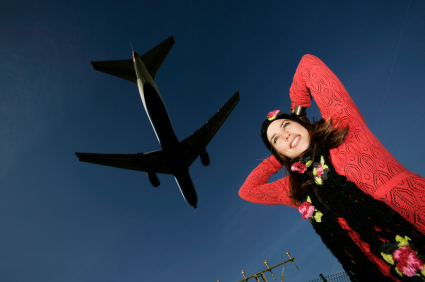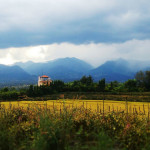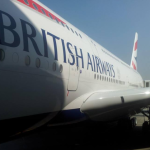
Overcome your fear of flying.
We all know that statistically flying is by far the safest means of transport, but that doesn’t stop even the hardiest of passengers suffering a fleeting jolt of panic every time a slight bump of turbulence is felt.
To this end I have compiled a few little facts that might explain all those unpleasant sensations and noises, and a few tips to keep you more comfortable and jet-lag-free!
To start with, anxiety is perfectly understandable; after all, it’s not often in our daily lives that we give complete control over our personal safety into the hands of a stranger in such extreme circustances. However, just look at the faces of the stewardesses. They’re completely relaxed and, even when busy and tired, still manage to walk about the cabin perfectly calmly without the need for a large stiff gin and two valium. They are completely at ease with being on an aircraft day in and day out, so I always think, if they can do it, so can I!
All planes will make odd thunking noises (when the landing gear retracts or comes down), or changes in engine noise that make it seem like the plane is decelerating. All this is perfectly normal so try not to pay any attention to it; sitting there listening anxiously to the sound of the engines won’t help your general state of comfort! Put on the earphones and listen to some music instead.
Turbulence is also completely normal. Most planes fly above extreme weather conditions, and the pilot will know if there are any patches of turbulence coming up and will advise you accordingly; planes are built to withstand these sorts of pressures, so once again, keep an eye on the faces of the stewardesses! They don’t panic when turbulence happens, so you don’t need to either!
I find the homeopathic remedies aconite and arnica to be excellent for pre-flight anxiety, but by far the best remedy I have found is Rescue Remedy. A couple of squirts is incredibly helpful and will ease those dreadful butterflies. Sit upright, place your palms on your thighs, and push hard with your feet against the floor; you should breathe slowly in through the nose and out through the mouth then you will feel out the fear and tension go out of your body!
In addition, if you start to hyperventilate, breathe slowly in and out of the paper bag in your seat pocket.
Make sure you know where your nearest exit is just in case of an emergency landing; smoke is the biggest danger if this should happen, and visibility may be poor, so always count how many rows away the doors are so you could do it in the dark if you had to.
As to the effect on your body, well, you are in a very artificial situation, and it’s no wonder that you feel a bit disorientated as a result. When you are flying at an altitude of 12,000 metres, the cabin is artificially pressurised to around 1500-2000 metres; most people live at around sea level so to be rocketed to this altitude in a very short space of time is going to take its toll.
However, there are ways you can minimise the discomfort.
- Wear loose clothing, as your body swells in the thinner air of the cabin.
- Take your shoes off, and have a blanket ready as the temperature can rise and fall quite a lot.
- Cocoon yourself with an eyemask and earplugs and try to rest comfortably (bring your own as many airlines don’t provide them any more).
- Drink lots of water; I know there is a temptation to avoid drinking, just so you don’t have to get up to go to the loo but it won’t help you feel better in the long run!
- Seats in the middle of the plane are best if you suffer from motion sickness.
- Suck a sweety on takeoff and landing to help your ears adjust. They don’t seem to provide them onboard anymore so make sure you’ve got some in your bag.
- Avoid spicy foods before takeoff and on the plane, as your body is struggling enough without having any extra strain on the digestion!
Jetlag occurs because the body’s Circadian Rhythms are out of sync with the time zone of the new destination, and can lead to tiredness, disorientation and bad temper; it can even effect the body’s immune system.
Normally hormones and seratonins are released into the bloodstream and govern our appetite and sleep patterns; when we change zones these are affected and it is thought it can take one day for every time zone crossed to recover our health and energy. The dry air on board can also make passengers more susceptible to all the bacteria breathed out by their fellow travellers, and even the efficiency of the digestive system can be affected.
So what can we do? Well, travelling to the east is worst than the west symptomatically. If heading east, eat as little as possible and try to get as much sleep as you can. If going west, you are lengthening your day so try and avoid sleeping until you get there.
- When you get on board change your watch to the new time zone to help get accustomised to it.
- Exercise. Keep walking about and wiggling your toes and even try some simple stretching; many airlines now have instructions for some exercises in their inflight magazine. You might look like a bit of a womble but it will help your circulation and make you feel better; it will also help reduce to risk of DVT so keep wiggling about!
- A celebrity we know who flies all round the world frequently swears by putting a piece of brown paper in each shoe; apparently it really works, though we have no idea how!
- Lavender on your travel pillow or a tissue helps you to sleep and is very good for alleviating the symptoms of jetlag; add a few drops to your bath when you get there and put a couple of drops on your pillow as well.
- Arnica is very good for restoring sleep patterns.

Article by Becci from www.girlstravelclub.co.uk.






